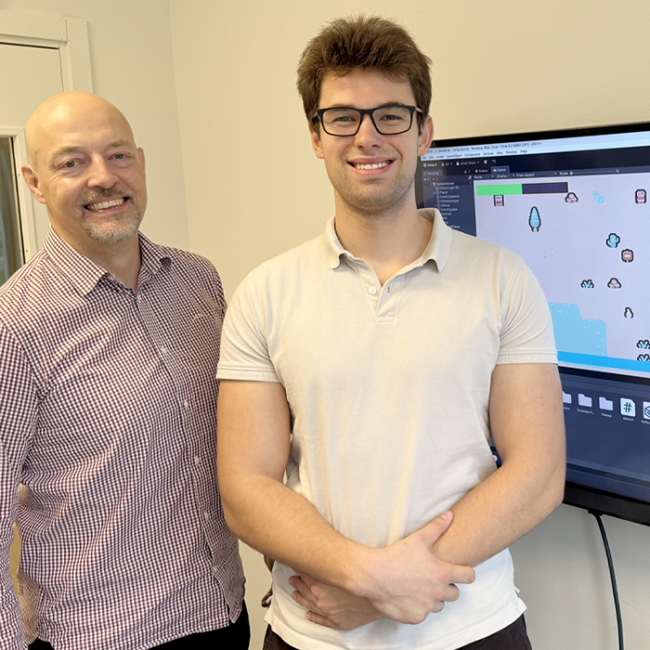Agile Projects for Game Producers in a New Course at Karlstad Business School
2025-10-21– The gaming industry is enormous today, and we give students a unique insight into game development with a focus on agile projects and the role of the game producer, says course coordinator John Johansson, lecturer in Business Administration at Karlstad Business School.
The course Game Producer Perspectives on Game Development is part of a larger educational package for those who want to become game producers – essentially project managers within the gaming industry – and students get to develop their own game concept.
– Students create a character, design a first level, and then use AI to build a simple prototype, explains John Johansson. We use the Unity game engine, one of the most established in the industry, and graphics are sourced from free resources.
Alexander Vestin, lecturer in Information systems and guest lecturer in the course, has developed nine base scripts that form the foundation of the game, which students then use to create their own prototype.
– One script controls the hero and its movements, another handles health and behavior of the game’s hero, and the others manage enemies, the final boss, graphics, and statistics, Alexander explains. Instead of writing all the code in a single script, AI is instructed to build from a base structure. Students then collaborate with AI to complete the code.
The purpose of the course is to give future game producers an understanding of the different roles in a game project – programmers, graphic designers, storytellers, and sound designers. Unlike traditional software development, game production is highly dependent on emotion and experience, and the game producer must be able to convey the vision – such as making the game feel scary or intense – and ensure this permeates every level.
Before the course, four game producers were interviewed: two from smaller studios and two from major players. In one of the larger productions, 18 studios and 500 developers were involved.
– Even though the course operates on a smaller scale, the same core principles apply, says John Johansson. The goal is for students to learn the industry’s language and understand the processes at an overarching level. This facilitates communication with different teams.
The course is a collaboration between the subjects of Business Administration, Informatics, and Project Management, giving students a competitive edge.
– Especially in the post-production phase, where prototypes are developed and then scaled up, says John Johansson. A producer who has taken the course can contribute by creating clickable prototypes – something that, according to those we interviewed, is crucial for quickly obtaining feedback and funding.
Connor Barnett, an exchange student and game designer from Canada, is one of the students in the course.
– Game design is a very niche industry, says Connor. Of the many universities I looked into, the School of Business stood out, and Sweden also reminds me a lot of Canada. Game producers are an important part of the gaming industry – they act as the glue that holds the development team together. Thanks to this course and the methods I’m learning – game production, leadership, and communication – I will become a better game producer.
Interest in the course has been high. It is currently offered on campus but will be available online starting in 2026.


